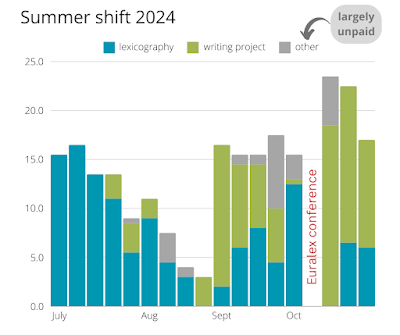Answer keys: more than an afterthought
Answer keys are a vital part
of ELT materials, relied on by teachers and learners alike, but probably rarely
given a huge amount of thought. A couple of recent writing projects, though,
have got me thinking about this undiscussed part of an ELT author's job and
what it can sometimes tell you about the rationale behind the materials more
generally.
Case 1: tight and unambiguous
On the first project, writing workbook materials
to go with a C1 general English book, part of the brief explained that in some
of the key target markets for the course, teachers were over-worked and had no
time to spend on marking homework. Thus, they wanted workbook material they
could assign as extra practice for homework that students could work through
and check the answers for themselves. For that reason, all the activities I
included should have clear, unambiguous 'correct' answers to go in the AK.
In addition, I was told that some teachers
lacked confidence teaching at higher levels, because they were often pushing up
against their own language limits, and so didn't want learners coming back to
them with questions or potential ambiguities in the workbook. Another reason to
keep things tightly keyed.
Of course, this had a significant affect on the
kinds of activities I could include. Many areas of language simply aren't black
and white, especially once you get to C1 level, and it's really quite hard to
construct activities where there's only one possible 'correct' answer without
making everything strictly multiple choice. And even if you do opt for multiple
choice (in some form), it can sometimes be hard to come up with distractors
that look plausible but are clearly incorrect. This was made even trickier by
the fact that I was also being pushed to keep the level high and the tasks
appropriately challenging!
Case 2: open and productive
The second project was again supplementary
materials, this time for B1+, that could either be given as homework or
potentially used in class. This time, the instructions were for a
proportion (actually set out in the brief as a percentage) of the activities to
be productive - with either some leeway in how students answered or completely
open. Multiple-choice activities were off limits!
From a pedagogical perspective, this is quite
freeing, letting you get away from what can often feel like rather mechanical
controlled practice and allowing more freedom for creativity - constructing
activities that best fit the language points. It's nice not having to tie
yourself up in knots trying to come up with unambiguous answers for everything.
However, it can have its downsides too. When
you're creating activities to practise a particular vocab set or grammar point,
you still need to construct an activity that guides the learners to use that
specific language. And sometimes, multi-choice is really just the most obvious
option.
Formats and formatting
Most projects I've worked on as an author
(including case 1 above) have asked for simple answer keys, by which I mean if
you have the following item in an activity:
1 The cat _____ (sit) on the mat.
... then the answer key would simply read:
1 sat
Sometimes, I've been allowed to give maybe two slashed alternative answers in the key or to give a very brief commentary explaining why one answer (perhaps a distractor or an obvious likely error) is incorrect/unlikely. I've also had instances where "suggested answers" were occasionally allowed - usually for the last activity of a section or for a writing task.
From a practical perspective, when I'm putting together an answer key, I generally use the split screen function in Word, so I can see the activity at the top of the screen and add the answers (generally at the end of the document) at the bottom.
Complete the sentences using the past simple of the verb in brackets.
1 Yesterday, the cat sat (sit) on the
mat.
At first glance, this seemed like it'd be a
fairly straightforward case of cutting and pasting, and to a degree, it
was. However, for someone who finds fiddly mousework painful, it turned out
to be especially tough going. I settled into an approach of writing the initial
activity with the answers in situ.
1 The cat sat (sit) on the mat.
Then when I was happy with the complete
activity, I'd copy that into the AK (at the end of the document), then go back
and 'blank out' the answers in the main activity - in fact usually replacing
the words with [WOL] (the standard abbreviation for 'write-on line').
1 The cat [WOL] (sit) on the mat.
Simple enough, right? Except that highlighting
exactly the word/words to be replaced with [WOL] with your cursor can be
quite fiddly, especially where it appears directly before a comma or full-stop
(without catching the punctuation mark) or where it's the contracted form of a
verb - the cat's sitting on the mat. After a long stretch of grammar activities
that included present/past continuous and present/past perfect, I started
trying to remember to leave spaces between the subject and contraction to make
it easier to highlight ... but when you're thinking and typing at speed, it's
actually surprisingly hard to do. Cue much swearing and rubbing of sore
hands/wrists!
Labels: answer keys, ELT writing, RSI
.png)



















